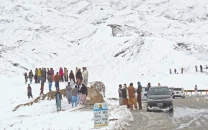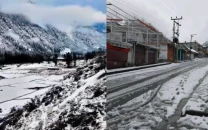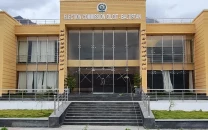Endangered: ‘Climate change threatening languages’
Blending, borrowing words is encouraged with migration, displacement

PHOTO: FILE
A study conducted by Zafar Shakir of Karakoram International University (KIU) reveals Shina language is a casualty of climate change.
Belonging to the Dardic tribe, the origin of the language dates back to the arrival of Aryans into Shinaki area (areas along the Hindukush and Karakoram) circa 1,500 to 2,000 BCE. Words from other languages have encroached into particular regions of the Shinaki area, thereby categorising it within the threatened languages.
Read: Issues of climate change discussed
“Human displacements and migrations tend to affect languages and cultures,” writes Shakir. He says this happened to Shina in Gilgit-Baltistan as well.
A lecturer at the Department of Modern Languages at KIU, Shakir carried out a study in September with 20 Shina-speaking participants displaced by floods over the past year. “Of those I interviewed, there were equal number of farmers, servicemen and women, students, and businessmen,” explained the lecturer. The study period lasted nearly two hours and 3,223 words were uttered by the target group. The use of non-Shina words were reported at 33% by the end of the study.
According to Shakir, “There is a direct and indirect impact of climate change on our material culture, which includes our clothing, agricultural norms and housing.” The lecturer added, “However, there is also a direct and indirect impact of climate change on our non-material culture, which revolves around languages.”
The KIU faculty member said the impact of climate change on the target group forced them to code switching (switching from one language to the next in one conversation), inter- as well as intra-sentential switching, and blending and borrowing of words from other languages.
The KIU faculty member said the impact of climate change on the target group forced them to code switching (switching from one language to the next in one conversation), inter- as well as intra-sentential switching, and blending and borrowing of words from other languages. He says climate change has become an additional indirect threat in influencing endangered languages and material cultures with displacements and migrations.
Published in The Express Tribune, October 18th, 2015.


















COMMENTS
Comments are moderated and generally will be posted if they are on-topic and not abusive.
For more information, please see our Comments FAQ